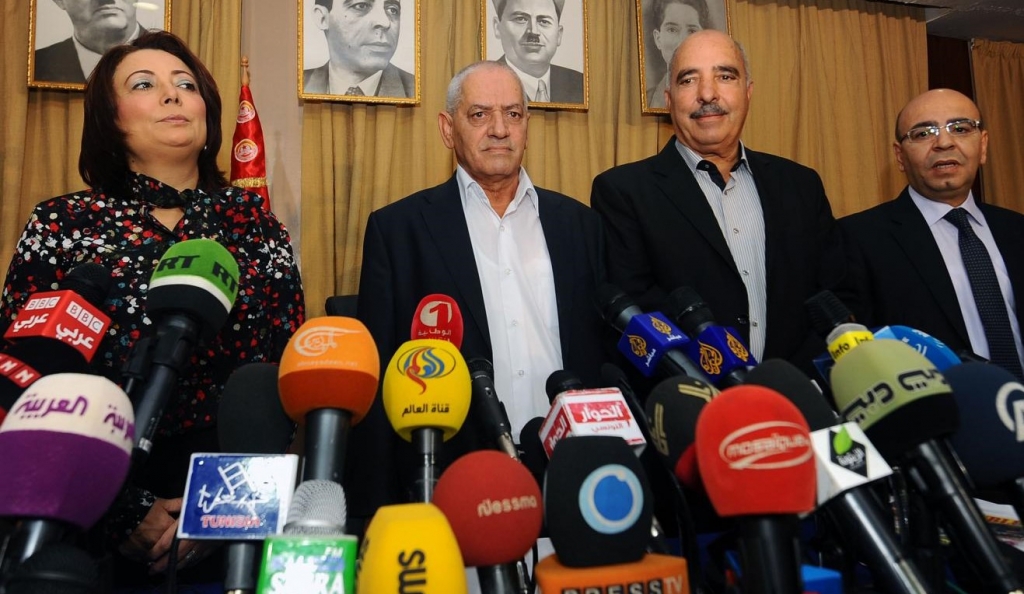-
Tips for becoming a good boxer - November 6, 2020
-
7 expert tips for making your hens night a memorable one - November 6, 2020
-
5 reasons to host your Christmas party on a cruise boat - November 6, 2020
-
What to do when you’re charged with a crime - November 6, 2020
-
Should you get one or multiple dogs? Here’s all you need to know - November 3, 2020
-
A Guide: How to Build Your Very Own Magic Mirror - February 14, 2019
-
Our Top Inspirational Baseball Stars - November 24, 2018
-
Five Tech Tools That Will Help You Turn Your Blog into a Business - November 24, 2018
-
How to Indulge on Vacation without Expanding Your Waist - November 9, 2018
-
5 Strategies for Businesses to Appeal to Today’s Increasingly Mobile-Crazed Customers - November 9, 2018
Tunisian National Dialogue Quartet wins the Nobel Peace Prize for 2015
But the committee’s statement makes clear that the award should be read as a broader recognition of the role of civil society in Tunisia, which, four years after the overthrow of President Zine el-Abidine Ben Ali, is the only Arab Spring country that is still a democracy.
Advertisement
Above all, said Kaci Kullmann Five, chairwoman of the Norwegian Nobel Committee, the prize was intended as “an encouragement to the Tunisian people”. “The broad-based national dialogue that the Quartet succeeded in establishing countered the spread of violence in Tunisia and its function is therefore comparable to that of the peace congresses to which Alfred Nobel refers in his will”. Formed in 2013, the group comprises the country’s General Labor Union, its Confederation of Industry, Trade and Handicrafts, its Human Rights League and Order of Lawyers.
Of all the Arab Spring countries it is viewed as the most successful: While other countries have succumbed to military dictatorships, or all-out civil war, Tunisia has maintained its democratic path, thanks to the dogged work of the quartet.
Soon after Julian Assange’s Wikileaks made public 251,287 top secret documents that exposed widespread corruption and oppression by the Tunisian regime in 2010, these four organisations began a peaceful struggle – known by many names – from Sidi Bouzid revolt – named after the city where the initial protests began to Dignity Revolution and finally the most popular one – the Jasmine revolution named after Tunisia’s national flower.
French President Francois Hollande said he was “happy for all the Tunisians” and added the prize marks the success of the former French colony’s transition to democracy.
“It is a great tribute to Hached, Belaïd and to the Tunisian working class that they have won the Nobel Prize for Peace”, said Prashad. The organizations represent differing values and sectors in Tunisian society.
Speculators had placed higher hopes on the Colombian peace process with the FARC guerrillas; the Iran nuclear deal by Iranian Foreign Minister Mohammad Javad Zarif and US Secretary of State John Kerry; and possibly even the United Nations refugee organization UNHCR for its relief efforts in the migrant crisis in Europe and the Middle East. German Chancellor Angela Merkel and Pope Francis were also tipped as hopefuls.
On the streets of Tunis, people welcomed the Nobel as a boost for democracy.
Despite recent disruptions of violence, Tunisia remains the only beacon still shining in the wake of the Arab Spring, according to R. Scott Appleby, dean of the University of Notre Dame’s Keough School of Global Affairs.
“It is a very good prize that tries to get into the heart of the conflict in the Muslim world”, said Oeyvind Stenersen, a Nobel historian.
The winners themselves were quick to recall the cost in human life, with the country’s powerful labour union saying it was a “tribute to martyrs of a democratic Tunisia”. Another in March killed 22 people, again mostly tourists, at the country’s leading museum, the Bardo in Tunis.
Maybe we Tunisians are too used to our day-to day-reality – the declarations of politicians, the economic losses and the constant security threats – to remember how much has already been achieved.
Advertisement
The UN chief reaffirmed the commitment of the UN to proudly stand in solidarity with the awardees as they work to build the peaceful and democratic nation that the Tunisian people deserve.





























